IBeacon Platforms: Ready Solutions for Building Applications
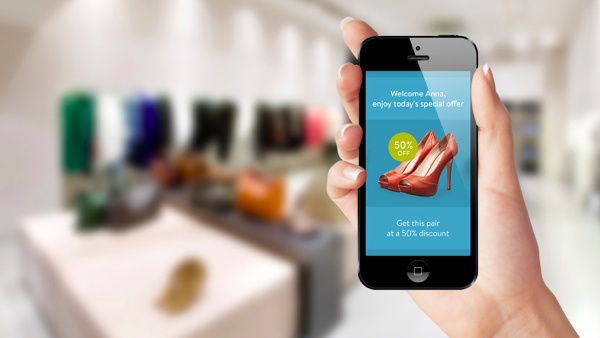
In a previous article, I shared the experience of choosing and ordering iBeacon - a small, stand-alone Bluetooth LE beacon that can be detected by a smartphone. There are new opportunities for creating mobile applications based on determining the exact (from a couple of centimeters to several tens of meters) the location of the smartphone owner.
The cornerstone at the moment is the search for valuable solutions for users. The most likely epogee experts suggest a contactless payment system.
')
I wanted to play with technology, and at the same time not get involved in the development. For this, I decided to find ready-made solutions that allow you to build iBeacon-applications without programming.
I got access and tested several platforms, which I will discuss in this article.
Indoors: http://indoo.rs

Platform for indoor navigation. Comes with tools for space modeling, placement of beacons in it, calibration, etc. The demo application allows you to see the simulation results.
LabWerk: http://labwerk.com

The main product is a solution for museums mApp.
There is a CMS (Content Management System) for creating articles about museum objects and setting notification rules. You can create surveys that are tied to specific regions in the museum. Multilingual support is supported. About visitors is going to statistics.
The application displays articles about objects of art when approaching them. There is a map of the museum which displays the current location of the visitor.
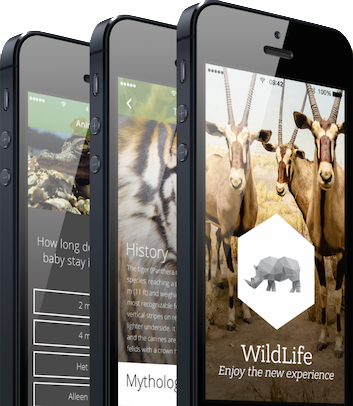
ShopJoy: http://shopjoy.se

The platform includes a demo application integrated with CMS, which can be downloaded from the App Store and Google Play . The app is original in Swedish. It is planned to add English. In the process of testing, the guys collected for me a localized version in Russian.
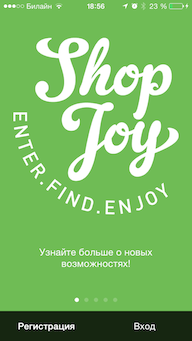
You can set up push notifications and display the web page defined for it in the browser built into the application. For push notifications, you can customize the text of the message, the response radius: Immediate (direct contact of the phone with a beacon), Near (up to 2 meters), Far (more than two meters), the campaign duration. It is also possible to target ads by age, gender and user interests specified during registration in the application.
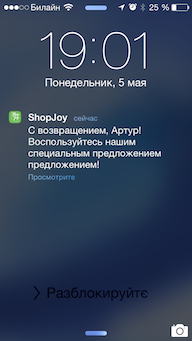
To gain access to the platform, you have to purchase the ShopJoy Demo Pack for 160 EUR , which includes 3 beacons from Estimote.
SmartBeacon: http://smartbeacon.eu

The platform in its capabilities is very similar to ShopJoy. You can add beacons (though without changing the UUID), configure push notifications with an indication of the response radius, several promotional content formats (picture, video, embedded browser). In the CMS there is a visualization of statistics. The company also sells its own production of beacons, the distinguishing feature of which are high-capacity batteries.

LocalSocial: https://www.mylocalsocial.com

Of all the platforms I have tested, LocalSocial has the richest features.
Using the CMS, you can set up geographic zones, promotions and special offers for them, register beacons and link them to specific regions, set up push notifications when entering the regions. Also implemented a loyalty system that allows you to earn loyalty points and issue promotional codes.
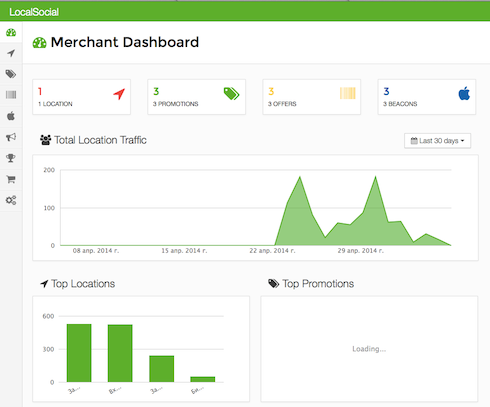
The demo application determines which of the geographic and local areas you are registered in the CMS, displays the intended graphic, text and promotional content.
Unfortunately, there is no possibility of setting the radius of response to the beacons, but the guys promise to implement this feature in one of the next versions. Also, they are currently working on new forms of promotional content, expanding it with a built-in browser to display a given website.
Pushmote: https://www.pushmote.com

The platform allows you to register beacons, configure push notifications for them and open a browser with a given web page or static HTML code. The team plans to implement a response radius setting (similar to ShopJoy), displaying rich-media content.

LightHouse: http://lighthousebeacon.com.au

The demo application can be installed by getting access to the beta from the developers of the platform. An API / SDK is provided for building your own applications.
The demo version of the CMS which you can see here . CMS allows you to register beacons and configure push-notifications when the phone appears with the application in their zone of visibility. Going statistics visit zones.

The team is focused primarily on the development of the CMS-system, and currently does not provide a demo application for mobile phones. But there is documentation for integrating your own application with the platform.
Platform Performance Comparison
| Features / Platform | Indoors | Labwerk | Shopjoy | Smartbeacon | LocalSocial | Pushmote | Lighthouse |
|---|---|---|---|---|---|---|---|
| Open access | Yes | not | not | not | not | not | not |
| In-door navigation | Yes | not | not | not | Yes | not | not |
| CMS system | Yes | Yes | Yes | Yes | Yes | Yes | Yes |
| Self-registration of lighthouses | Yes | Yes | not | Yes | Yes | Yes | Yes |
| Push notifications | not | Yes | Yes | Yes | Yes | Yes | not |
| Adjust response radius | - | not | Yes | Yes | not | not | not |
| Promotional Content | not | Yes | Yes | Yes | Yes | Yes | not |
| Loyalty system and specials offers | not | Yes | not | not | Yes | not | not |
| Demo application | Yes | not | Yes | Yes | Yes | Yes | not |
| User Targeting | not | not | Yes | not | not | not | not |
| API / SDK | not | not | not | not | not | Yes | Yes |
Other platforms
For completeness, I will provide a list of other platforms found, but not tested personally.
findings
Having looked at several of the existing platforms, I could not answer the most interesting question for myself: what is their real value for the end user? Why does he install a new application?
Also, I could not find a single solution that could be considered complete for a specific business segment, whether it be retail, museums, navigation or something else. All platforms provide basic and rather demonstration functionality that needs to be improved.
The option of connecting to one of the listed platforms at the API / SDK level may well be working for the sake of saving forces on developing your own CMS. But developing your own application for specific tasks, if you have them, is unavoidable.
Source: https://habr.com/ru/post/221889/
All Articles